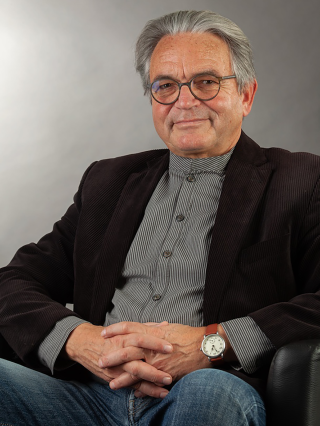Nachdenken über Wagner - Deutsche Oper Berlin
What moves me
Thoughts on Wagner
Richard Wagner comported himself as a lonesome genius, as the greatest composer of all time. That was how he wanted to be remembered. Conductor Ulf Schirmer reflects on the man behind the myth
Much has been written about the close friendship between Richard Wagner and Friedrich Nietzsche. It is said that on one occasion Nietzsche wanted to pay a surprise visit on the Wagners at their villa in Tribischen on the shore of the Vierwaldstättersee. As he approached the house, he heard the maestro playing the piano at an open window. He spent two hours outside the window, eavesdropping as Wagner played the same four bars over and over again, four bars that would eventually form part of SIEGFRIED.
This charming anecdote shows the amount of thought Wagner put into the suggestive power of his music and the impact of mantra-like repetition. I get drawn in, too, when I’m conducting Wagner. Any musician can relate to that, the way you have to banish thought and let yourself be enveloped in the music. As soon as you try to restrict your performance to a cognitive exercise, it becomes wooden and loses conviction. If there’s one body of work that doesn’t bear being tackled in that way, it’s Wagner’s.
Lightness, openness, resolution: these are states of awareness that Wagner has helped me acquire. A meditative mood, time flowing and floating, boundaries blurring… meanwhile I’m getting a sense of distance, a feeling for the harmonic direction the music wants to go. Wagner was fully aware of the effect it had on the hearer. I visualise him and Nietzsche discussing these elements of perception.
This was not the image that Wagner presented to the public, though. He cultivated a certain mystique, putting himself about as a late romantic genius, a prodigy, one of a kind. Nietzsche had his own room in the Wagners’ home, but not even he was allowed to observe the master at work.

I have to say I’ve relished the process of debunking his self-mystification. When I was General Music Director and Artistic Director of the Oper Leipzig, we mounted all 13 of his stage works in chronological order – something that Wagner always prevented people from doing. In Leipzig it meant we could unveil the man behind the work. The early works especially reveal an extremely knowledgeable and highly trained young composer who is in awe of musical role models, testing out new styles and evolving in leaps and bounds.
The only work by Wagner that I haven’t directed is RIENZI, Hitler’s favourite opera. When I was starting out as a pianist at the Wiener Staatsoper, I actually began working on an abridged version of it, but I just couldn’t immerse myself in the music. I felt a very strong and definite blockage and it’s never gone away. THE MASTERSINGERS OF NUREMBERG, too, has had a complicated reception, but there I’m happy to plunge in and grapple with the resolution, the identification with characters – and I still keep sight of the gesamtwerk, the shape and scale of the opera. That’s the thing about Wagner: he teaches us to strike a balance between immersion and distance. And then into this meditative state crashes the closing monologue, in which Hans Sachs warns against undue foreign influence on German culture, and the opera lurches in the direction of nationalist populism.
You have to adopt a position on this bit of the story. When I’m directing and we arrive at this point, I get the feeling that something’s not quite right, as if I’m stepping out of a two-dimensional film. Musically, it’s already wrapped up. Anything that follows seems contrived and almost an afterthought.
After Leipzig I took a sabbatical. I had a year’s rest from music, which included only attending one performance. When the Deutsche Oper Berlin asked me to do THE MASTERSINGERS OF NUREMBERG, I didn’t hesitate. Next year will mark 40 years since I first got to work with this fantastic orchestra and its deep, warm sound. Erich Leinsdorf, the conductor, once said something to the effect of »Just as people evolve while conversing, conductor and orchestra are both evolving during the very act of making music together.« I can’t wait to work with the orchestra of the Deutsche Oper Berlin.




